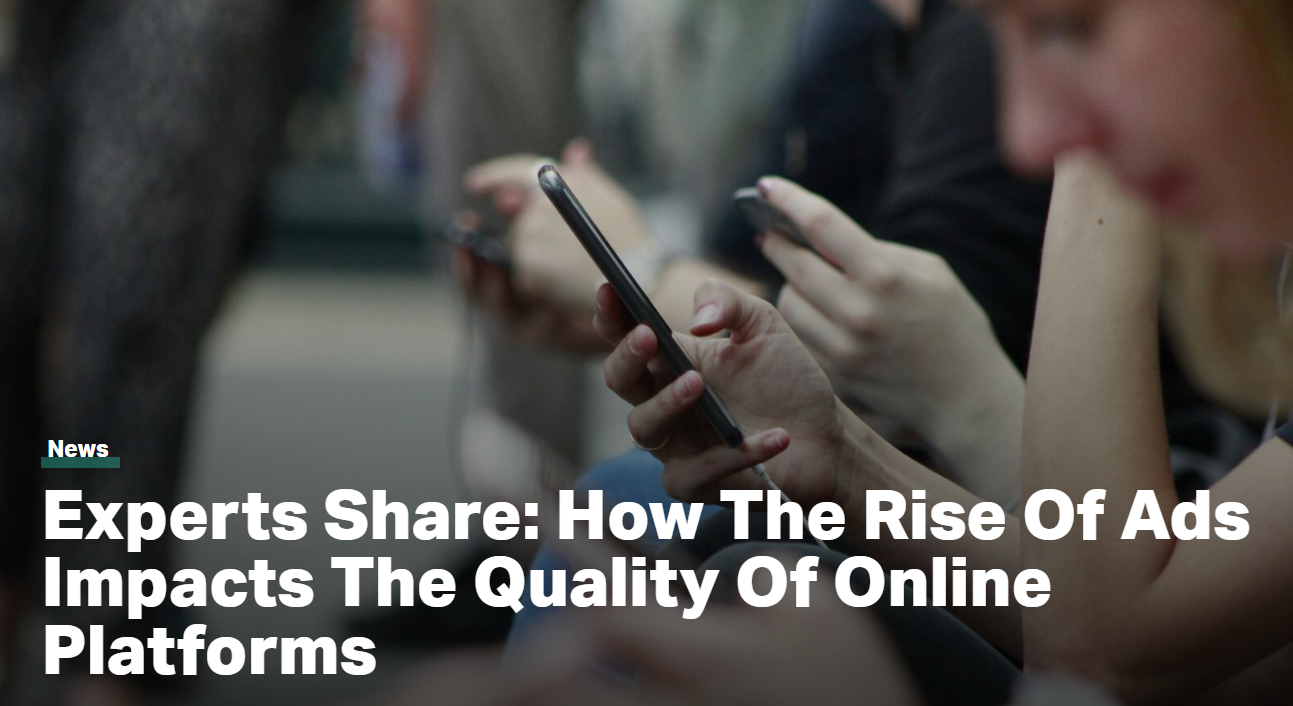Experts Share: How The Rise Of Ads Impacts The Quality Of Online Platforms

Advertising certainly has moved from being just television, radio and newspapers. McKinsey reports that new systems called commerce media networks are driving growth across platforms where people already spend time, such as travel apps, streaming sites and payment services. These networks place adverts directly within digital experiences, turning shopping, booking flights, even using a ride-hailing app, into a marketing opportunity.
The US market for CMNs is expected to reach more than $100 billion by 2027, with an annual growth rate above 21%. McKinsey’s survey of 150 advertisers showed that 55% plan to raise their CMN spending in the next year. Advertisers are moving around budgets to be less social media and search so they display more ads with CMNs, which use first-party data to target people more precisely. This means more advertising is appearing in everyday activities that previously seemed free from commercial messages.
Large names such as Uber, United Airlines, DoorDash and PayPal now run their own media networks. This gives brands the chance to reach consumers through travel, delivery and financial platforms, where purchase intent is already high. Nearly 70% of travel advertisers and 60% of consumer goods companies said they plan to increase their spending in this space.
How Are Users Responding To Constant Advertising?
Not long ago, Meta announced that people in the UK will soon have to pay to remove adverts from Facebook and Instagram. The subscription will apply across all linked accounts through Meta’s Account Centre.
The company said that in 2024, its advertising tools helped create £65 billion in economic activity and over 357,000 jobs in the UK. Every pound spent on ads through Meta generated an average of £3.82 in revenue for UK companies. Meta argued that the UK’s more flexible rules compared with the EU make it easier to offer users choice without harming business growth.
With adverts appearing on more platforms, users are starting to question whether free services are truly free. Are all these targeted ads and strategies to make users pay for no ads impacting the overall user experience?
As Jason Patterson at Jewel Content Marketing Agency, said: “Advertising makes social media less social, by revealing its fundamental purpose as being commercial. People don’t mind advertising when it’s more attractive or interesting than what’s around it, but that’s rarely the case on social media, where fraudulent ad data makes advertisers believe their s**t don’t stink.”
Experts share their thoughts on this..
James Taylor, CEO and Founder, Particular Audience
The “enshittification of the internet” is a term that seems to get used more and more frequently.
“We don’t want pop ups, we don’t want spam, and we don’t want ads.
“At the same time: We don’t mind a discount, we don’t hate emails from aspirational sources and we don’t mind clicking when we love what’s been suggested to us.
“Meta will get its no-ad subscribers. Social media is part of our muscle memory. It’s an adopted habit, so it’s not crazy to imagine that people will pay for it.
“But for most of us who don’t pay, since we’re happy to take a few ads in return for a free service, ad density is a real problem. Ad density becomes an issue when a platform needs to simply add moreads to increase their revenues, and platforms are under pressure from investors to do just that.
“When ads are relevant, they can perform better without needing the brute force of volume. This doesn’t work well for user experiences over time.
“Google famously tested the long term impact of too many ads, and it is what led them to reduce the number of ads on mobile. Meta has clearly hit a similar ceiling.
“As retail media proliferates across retailers, the same questions are popping up around whether a retailer should or shouldn’t put ads on their websites. The reality is eCommerce is already pages full of ads. Which products you do or don’t click on are indistinguishable from ads. Successfully introducing supplier funding into the ranking cocktail of eCommerce search results ultimately comes down to the same concepts of relevancy that make an organic eCommerce experience good or bad. Technology matters, and relevancy matters.”
Piero Pavone, CEO, Preciso
“Meta’s move came as a surprise to me, because advertising on social platforms is not overly intrusive, nor should it be. If advertisers use native formats that blend in seamlessly with the content around the ads, then advertising doesn’t need to be intrusive and can actually add to the overall experience. This is what hundreds of publishers running native ads on our Ultima platform have found since we launched the solution earlier this year.”
James Macdonald, Co-Founder and CRO, Limelight
“Ads or no ads, that is the question , both from a commercial perspective as well as the user’. This is not a new thing. The Times and Sunday Times made a decision to go behind a paywall some years back. Spotify, and other platforms, offer the option to remove ads for an upgraded subscription. I personally think ads actually can and do add value if curated and managed in the right way by the publisher/platform but that’s another article in itself.
“In Meta’s case, it’s definitely a very real issue, as it’s clear the intrusive and indiscriminate nature of some of the targeting and creative, not to mention the content itself, really can dilute and affect the quality of the experience. On the other hand, for Meta to deliver many of the services it does , it kind of needs to be paid, so as ever, it’s a trade-off, and one that applies to many other publishers. In a nutshell, advertising economically powers the service and enables the platform to provide free access for the user, and Meta wouldn’t even exist today if Facebook hadn’t used ad revenues to build its business.
“In Meta’s case. I’d also hazard a guess that external pressure to better manage what has become a bit of a “Wild West” scenario has pushed them to make what is ultimately a headline-making play by offering a “subscription equals no ads” option. One thing you can be sure of is that Mark Zuckerberg and his team will keep a close eye on the bottom line and that’s ultimately what will decide how this will play out.”
Suzanna Chaplin, CEO & co-Founder, esbconnect
“Meta’s ad-free subscription simply recognises human nature: no matter how creative your ad is, some people just don’t want to see ads. And if I’m being cynical, the announcement might be due to Meta’s aggressive targeting and a high level of complaints. People feel ther privacy is being breached when they say something out loud, and suddenly they see ads for it on Instagram…it’s clear they are listening.
“Or you type something in a WhatsApp message and randomly see an ad for it…despite being told your data is encrypted. Or you click on an ad for a pair of shoes and all you are served for the next week is ads for shoes from every man and his dog. It’s not the ads themselves that are at fault, but rather the platform monetising advertisers’ desire to get a consumer’s attention. Maybe this should signal to advertisers that social is noisy, and perhaps there are better places to spend your money to acquire new users.”
Read more in: TechRound



